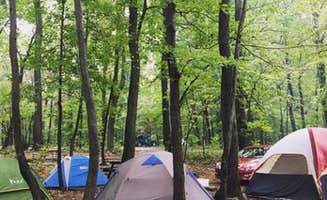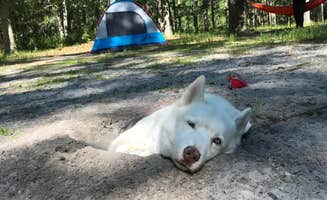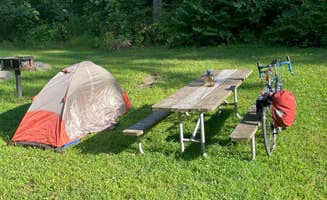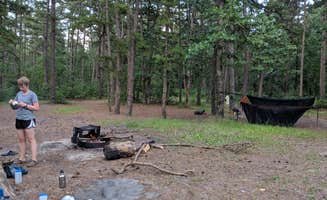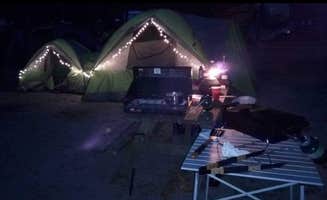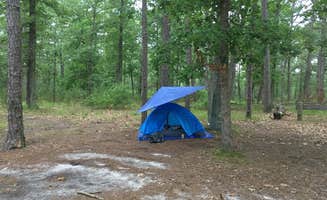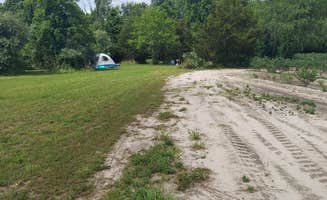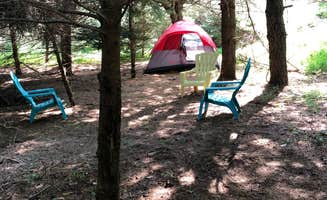Tent camping near Langhorne, Pennsylvania typically features sandy soil conditions that drain quickly after rainfall, unlike the moisture-retaining parks mentioned elsewhere. The region sits at approximately 200 feet above sea level with a humid subtropical climate that brings warm, humid summers with temperatures averaging 85°F from June through August. Most primitive campsites require 50-100 yard walks from parking areas to reach the actual tent locations.
What to do
Hiking trails for birders: Fort Washington State Park Campground offers 3.5 miles of trails leading to observation decks where serious birding happens. "Should you call yourself a bird watcher, you'll be particularly interested as from this very spot you can view the beautiful raptors that migrate here on a seasonal basis in both the Spring and Autumn," notes a camper who spotted various species including "Bald Eagles, Great Horned & Barn Owls, Pileated Woodpecker, Red-eyed Vireo."
Creek exploration: At Evansburg State Park Campground, the creek provides cooling relief during summer camping trips. One camper shared, "Great place to creek hike, nice for horses, we did get a lot of ticks, but not deer ticks, thankfully." The park's water features are accessible via multiple walking paths with gradual elevation changes suitable for most fitness levels.
Historical immersion: Within 30 miles of Langhorne, history buffs can explore Revolutionary War sites while camping. "Washington Crossing Historic Park, straddling Pennsylvania and New Jersey along the Delaware River, is one of those rare places where you can literally camp in history," notes a visitor who appreciated the "structured, group-style camping steeped in Revolutionary War atmosphere."
What campers like
Secluded tent sites: Round Valley State Park Campground offers genuinely remote tent camping with boat or hike-in access only. "This is a great campground that is super private and quiet - great for getting out to enjoy the sights and sounds of nature. It's a pretty strenuous hike, but you'll be rewarded for the effort!" explains one camper. Sites require either a 3-6 mile hike or boat access across the reservoir.
Primitive camping atmosphere: Many campers appreciate the no-frills experience at state parks near Langhorne. "Think old-school camping: fire rings, pit toilets and a heavy dose of 'leave no trace' ethos," notes one camper about the sites. This back-to-basics approach creates opportunities for more authentic outdoor experiences without modern distractions.
Wildlife viewing opportunities: Dawn and dusk bring increased animal activity at Batona — Wharton State Forest. A regular visitor commented, "It is so easy to get lost in these woods and I LOVE IT! I grew up near the pine barrens and would camp here many times with friends. If you want off the beaten path and not close to anyone... this is IT!" The Pine Barrens ecosystem supports unique wildlife viewing opportunities in a distinctly different environment than other nearby camping options.
What you should know
Site access limitations: Many campgrounds near Langhorne restrict individual camping in favor of organized groups. A visitor to Ridley Creek State Park noted this limitation: "Love Ridley and their trails. However, there is only group tenting here. I would stay over in a heartbeat though as I'm always here!" Call ahead to confirm reservation requirements before planning your trip.
Primitive facilities standard: Most tent camping within 30 miles of Langhorne offers minimal amenities. "Carry-in/carry-out trash policy means becoming one with your garbage until civilization or squirrels show up," explains one camper. Expect non-flush toilets, limited water access, and few amenities beyond fire rings and perhaps picnic tables.
Weekend crowding patterns: Spring and fall weekends see highest campground occupancy rates. One camper reported about their experience: "The camp ground is secluded and right on the Delaware River. Very enjoyable." Weekdays typically offer better site availability and more isolation, particularly at the most accessible campgrounds.
Tips for camping with families
Spacing considerations: At Deep Creek Campground at Green Lane Park, site proximity can be an issue with children. One camper observed, "Sites are close to each other with absolutely no privacy." Another noted: "The spaces are right on top of each other with no tree cover between spots, so you'll definitely be right up on your neighbors." Weekday camping provides better spacing opportunities.
Water accessibility: For family tent camping trips, sites near water features provide built-in entertainment. "The water is crystal clear, the area is clean. There's bathrooms and pumps but we just filtered the water from the reservoir instead which tasted a million times better than the well water," shared a camper about their reservoir-side experience.
Transportation logistics: Pack strategically when camping with kids as many sites require carrying gear. "Only downside is having to haul gear by foot to the campsite. Some are further than others," notes a visitor about walk-in requirements. Consider bringing wagons for gear transport or selecting closer sites when camping with smaller children.
Tips from RVers
Size restrictions: Larger RVs face significant limitations at most tent-focused campgrounds near Langhorne. "This is not a spot for RVs or 5th Wheelers," warns a camper about one location. Most sites accommodate tent camping or small pop-up campers only, with limited access roads unsuitable for larger rigs.
Alternative accommodations: When traveling with both tent and RV campers, consider splitting accommodations. "There are farms and animals to see, hikes along the Delaware river, Bowman's tower with a great view of the surrounding area and much more," shares a visitor about the day-use options near campgrounds that can be enjoyed by those staying in nearby RV parks while tent campers use the primitive sites.


